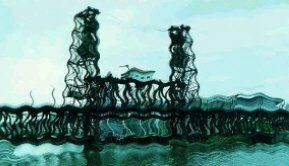
woven into: W.H. Prescott, History of the Conquest of Peru. Quoted in, J. Giles, Bridges and Men. Garden City, NY., 1963. p.2.

imaginative space: "Bridges perhaps more than any other single structure, can radically alter the face of a landscape. A massive redistribution of imaginative space can result from the construction of a major new bridge. Indeed this was part of their attraction to early visionary designers." P. Bishop, "The Soul of the Bridge: A study in Anima Mundi Psychology." Paper delivered at Inaugural Conference of the London Convivium for Archetypal Studies. London, England. June, 1987.
viewing of images: In a study of blind people it was found that "the longer a person is blind, the less rapid eye movement occurs during REM." O. Flanagan, Dreaming Souls. New York, 2000.
according to: "Now is described Atman, whose nature is incomprehensible to the ordinary understanding. It is the unchanging Consciousness present in man, and the Witness of his waking, dream, and dreamless states." Katha Upanishad. In, S. Nikhilananda, Translator. The Upanishads. Vol. 1. New York, 1949. p.172.
a place dreamed: See Pons-1.
Chuang Tzu's butterfly: Chuang-Tzu once dreamed he was a butterfly. When he awoke, he no longer knew if he was a butterfly dreaming he was a man, or a man who had dreamed he was a butterfly.
Chuang Tzu (369? - 268 B.C.) "was a leading thinker representing the Taoist strain in Chinese thought. Using parable and anecdote, allegory and paradox, he set forth the early ideas of what was to become the Taoist school. Central in these is the belief that only by understanding Tao (the Way of Nature) and dwelling in unity can man achieve true happiness and be truly free, in both life and death. Witty and imaginative, enriched by brilliant imagery, making sportive use of both mythological and historical personages (including even Confucius), the book which bears Chuang Tzu's name has for centuries been savored by Chinese readers." www.coldbacon.com/chuang/bio.html
Psyche's honey: "In one of the lighter of his thousand ways of speaking of the psyche, (C.G.) Jung conjures up the Greek sense of butterfly: the quick-moving creature, changeful of hue, reeling drunkenly from flower to flower, living on honey and love." N. Hall, The Moon & The Virgin: Reflections on the Archetypal Feminine. New York, 1980. p.21. This verbal play is reminiscent of the movement of dreams, with love being the sweetest mesmerization.